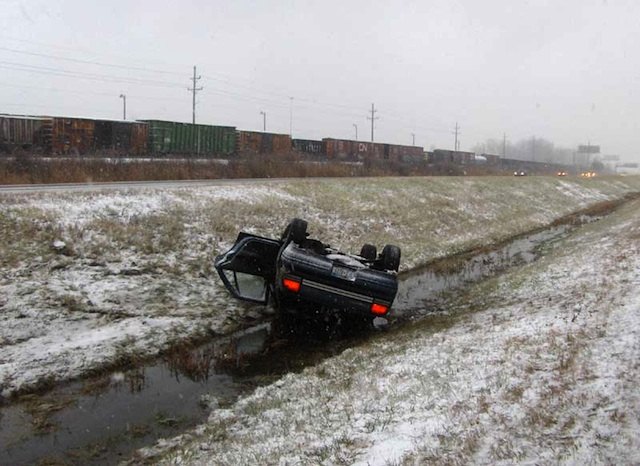NHTSA: ABS Braking Increases "Fatal Run-off-Road Crashes" by 34%
A National Highway Transportation Safety Administration (NHTSA) study on Antilock Braking Systems (ABS) reveals that they’re not all that. In fact, the technology increases fatalities in certain circumstances. (Not that Frank Williams didn’t warn you back in 2006.) “ABS has close to a zero net effect on fatal crash involvements. Fatal run-off-road crashes of passenger cars increased by a statistically significant 9 percent (90% confidence bounds: 3% to 15% increase), offset by a significant 13-percent reduction in fatal collisions with pedestrians (confidence bounds: 5% to 20%) and a significant 12-percent reduction in collisions with other vehicles on wet roads (confidence bounds: 3% to 20%).,” “The Long-Term Effect of ABS in Passenger Cars and LTVs” reports [ download pdf here]. “ABS is quite effective in nonfatal crashes, reducing the overall crash- involvement rate by 6 percent in passenger cars (confidence bounds: 4% to 8%) and by 8 percent in LTVs (confidence bounds: 3% to 11%).” That doesn’t sound . . . confidence inspiring. In fact, that nine percent increase looks even worse close up. A LOT worse.
But previous statistical evaluations of ABS have had ambiguous results. Analyses of data from the early 1990s showed significant increases in fatal run-off-road crashes with ABS, on the order of 28 percent. The increase was baffling, given the success of ABS on the test track. However, at that time, many drivers did not yet know how to use ABS correctly. During the mid-1990s, the safety community worked hard to inform the public about the correct use of ABS (“Don’t let up on the brakes”; “Stomp, stay, and steer”). A second generation of analyses circa 2000 showed much smaller increases in run-off-road crashes that were no longer statistically significant. But they were based on just two or three years of data and left uncertainty about the overall effect of ABS.
A nine percent fatalty increase sounds bad. A twenty-eight percent increase is an epic fail. But we’re not finished here:
On wet, snowy, or icy roads, where ABS is most likely to activate, the increase in fatal run-off-road crashes is a statistically significant 34 percent in passenger cars (confidence bounds: 20% to 50% increase). On these roads, all three types of fatal run-off-road crashes increase significantly for cars and so do fatal rollovers of LTVs.
WTF?
We are still unable to provide a convincing explanation or empirical evidence (other than the crash statistics themselves) for the increase in run-off-road crashes.
The aforementioned Mr. Williams reckons “I still think people don’t understand ABS, and when it starts pulsing and grinding they think something’s wrong and overreact. Maybe instead of spending so much money hyping hybrids, the auto companies need to do some commercials on how the safety systems in their cars work.”
So, is this a whitewash? The report’s emphasis on ABS’ net impact rather and statistical downplaying of ABS’ negative impact certainly should give NHSTA supporters pause. In fact, shouldn’t the NHTSA call for a moratorium on the technology?
But no, the report is suffused with reassurance that the next big thing in safety—federally mandated ESC (Electronic Stability Control)— will sort out the ABS “anomaly.”
Although the preceding analyses show a significant 9-percent increase for ABS on run-off-road crashes of passenger cars, the increase is small relative to the likely benefits of ESC. NHTSA’s 2007 evaluation of ESC, based on statistical analyses through calendar year 2004, found a 36- percent reduction in fatal run-off-road crashes. Thus, the combined effect of ESC and ABS is an estimated 30-percent reduction of fatal crashes.
So that’s alright then? Tell that to the families of drivers and passengers of vehicles where ABS was the difference between life and death, and not in a good way. Either that or just wait for the lawsuit.
More by Robert Farago
Latest Car Reviews
Read moreLatest Product Reviews
Read moreRecent Comments
- VoGhost "compliance EVs" - so typically Posky. Come on, Matt, come clean about what Big Oil is paying you already.
- VoGhost Great to see leadership from Washington in supporting American businesses and job creation.
- VoGhost Oh, Mattie, I am BEGGING you to take a course in economics. There's probably a community college near you offering courses for free or very cheap. Seriously, people this ignorant of basic economics really should not be writing this drivel. Stick to what you know: pimping for big oil.
- 2manyvettes I was a computer instructor in a local technical college for some years teaching Windows OS and Micosoft Office. Not long before I retired I purchased a Mac Book Air laptop. It didn't take me long to learn the Apple OS and the first thing I learned was the lousy job Microsoft did ripping off the Apple software. I purchased Microsoft Office for Apple at the time and discovered when Apple upgraded the OS to 64 bit and my 32 bit Office software would no longer run on the laptop, that embedded in the Apple OS was software that could open any Office file and could save any file in Microsoft file format. I have always felt if Apple sold product at PC prices they would put Microsoft out of business. Oh, and I bought my Mac ten years ago and still runs like brand new. Effect on Rivian? Who knows? Based on my experience with their technology, it could be interesting.
- Spectator This was an amazing vehicle. Back then Acura knew how to make a plush and comfy seat!


































Comments
Join the conversation
If I am braking hard on the highway at the beginning of a jam, I always use the European custom of switching on the Hazards, I have noticed that trucks do this as well. But I think its helpful, especially if I am in the left lane.